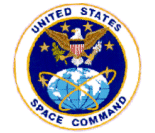United States Space Force
 The U.S. government announced on 29 August 2019 to establish the U.S. Space Command to defend its interests in space. "This is a landmark day, one that recognizes the centrality of space to America's security and defense," President Donald Trump said in a White House ceremony joined by John Raymond, the first commander of U.S. Space Command.
The U.S. government announced on 29 August 2019 to establish the U.S. Space Command to defend its interests in space. "This is a landmark day, one that recognizes the centrality of space to America's security and defense," President Donald Trump said in a White House ceremony joined by John Raymond, the first commander of U.S. Space Command.
Trump ordered the establishment of Space Command in late 2018, making it the 11th unified combatant command of the U.S. Department of Defense. The newly established Space Command is built to "protect America's dominance in space" by "employing assigned forces from every branch of the military" and "delivering combat power by operating superior space capabilities such as communications, intelligence, navigation, and early missile detection and warning," according to a White House statement.
The new command is believed to be a step towards building an independent Space Force, a plan that still requires Congress approval. "As a unified combatant command, the United States Space Command is the next crucial step toward the creation of an independent Space Force as an additional armed service," said U.S. Secretary of Defense Mark Esper in a press conference.
US Space Command
 US Space Command was disbanded on October 1, 2002 and its responsibilities were handed over to US STRATCOM.
US Space Command was disbanded on October 1, 2002 and its responsibilities were handed over to US STRATCOM.
As one of the nation's nine unified (multi-service) commands, U.S. Space Command coordinated the use of Army, Naval and Air Force space forces. These space forces provide the information needed by the US military to out-maneuver the enemy, attack with precision and protect themselves from attack.
The men and women of U.S. Space Command put the satellites that provide these capabilities in orbit, operated them, protected them, and ensured that the information they provide is exactly what America's warfighters need to protect national security interests today and tomorrow.
USSPACECOM coordinated the use of the Department of Defense's military space forces in providing:
- Missile Warning - Defense Support Program satellites and ground-based radars provide both strategic and theater ballistic missile warning to our nation's leadership and to deployed troops worldwide.
- Communications - Communication satellites provide constant global connectivity with deployed forces.
- Navigation - The Air Force Space Command's Global Positioning System (GPS) constellation of 28 satellites provides precise navigation and timing support to coordinate the positioning and maneuver of U.S. and allied aircrews, naval forces and ground forces.
- Weather - Defense Meteorological Satellite Program collects and distributes global weather data.
- Imagery & Signals Intelligence - U.S. military space operators coordinate space-based imagery between intelligence agencies and planners within Unified Commands.
USSPACECOM's major functions were to support the North American Aerospace Defense Command (NORAD) warning and assessment, conduct space operations and, computer network operations:
- Space Support - Launching and operating satellites, including satellite operations and telemetry, tracking, and commanding and, spare activation. All launches occur at Cape Canaveral Air Force Station, FL, or Vandenberg Air Force Base, CA
- Force Enhancement - Satellite communications, navigation, weather, missile warning and intelligence.
- Space Control - Assuring U.S. access to and freedom of operation in space, and denying enemies the same.
- Force Application - Researching and developing space-based capabilities that have the potential to engage adversaries from space. Requires policy change before implementation.
- Computer Network Defense/Computer Network Attack (CND/CNA) - Computer Network Defense includes protecting and defending information, computers, and networks from disruption, denial, degradation, or destruction. Computer Network Attack includes developing the capabilities to disrupt, deny, degrade or destroy information resident in computers, computer networks or, computers and networks themselves. The USSPACECOM component command for these missions is Joint Task Force - Computer Network Operations.
- Information Operations (IO) - Although not a specific mission, USSPACECOM is the sponsor for the Joint Information Operations Center (JIOC) at Lackland AFB in San Antonio, Texas. The JIOC maintains specialized expertise in IO systems engineering, operational applications, capabilities and vulnerabilities. The JIOC also assists with the development of IN doctrine, tactics and procedures.
|
NEWSLETTER
|
| Join the GlobalSecurity.org mailing list |
|
|
|

